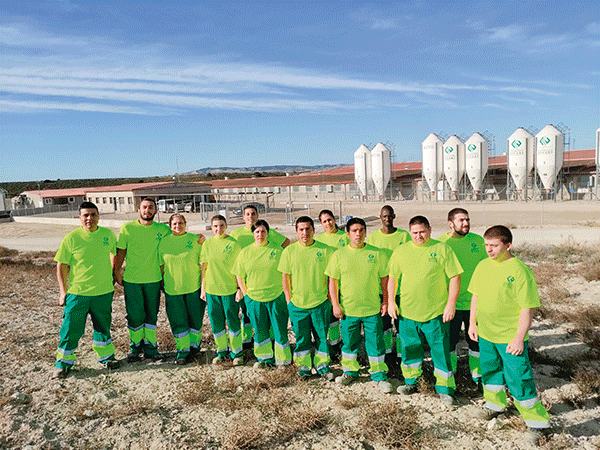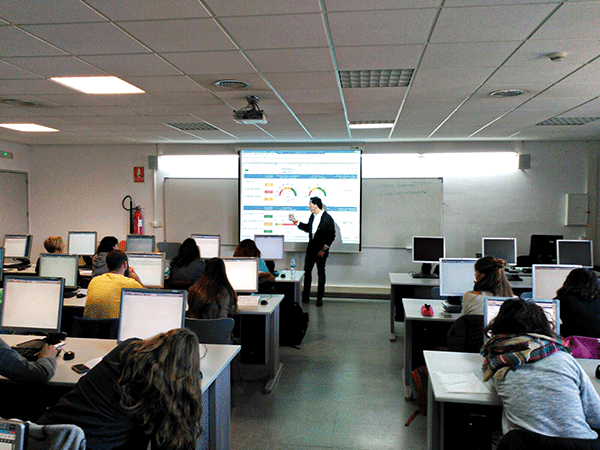Blog
Blog

P. López: "Training is the engine of change and professionalisation"
06th October 2022 - News
Having trained and motivated staff is one of the monumental challenges that many farms face. To achieve it, it is essential to develop training programs that convey all the knowledge necessary to carry out farm work, as well as the importance and magnitude of the pork industry. We discussed these issues with Pedro López, the Agricultural Engineer and Development Director of 333 Academy.
First, what is the work team's importance within a farm?
People are the most important asset on a farm since they are the ones who carry out all the day-to-day tasks and supervise the proper functioning. The staff ranks first in importance on a farm, even before designing it, since you have to know what work team you are going to count on. Not only are people important, they are essential. When talking about business success, it is vital to put staff first. They are everything.
How does the staff's attitude and training influence farm productivity?
Attitude and training may seem intangible when assessing how it influences farm productivity or that it is not important to invest in them, but people are the ones who provide a competitive advantage. Attitude is much more important than experience because the attitude is had or not, but experience can be gained. The desire to improve and learn is key, and that is achieved through continuous training. Attitude and training are synonymous with efficiency, and that leads to a direct growth in the results.
What training should pig farm staff have?
Following the new Royal Decree on pig farm management (RD 306/2020) and depending on each autonomous community, the staff of a pig farm must have a minimum compulsory training, comprising a 20-hour basic training course. Every five years, a ten-hour course of knowledge adequacy must be taken. Personnel with an experience of over three years may be exempt from basic training, but they must undergo adequacy training every five years starting 2027. Newly incorporated workers must have this training within six months from the start date of their contract. The courses to be taken are: Handler and Applicator Course for Biocidal Products; Animal welfare course; Animal health, hygiene course, environmental management and fight against climate change.

People are the most important asset of a farm. Photo: Pedro Lopez.
Beyond initial training, is it also important to develop ongoing and on-farm training programs? What type?
Yes. Initial training is essential and is the minimum required by law, but ongoing training programs are very interesting since technological advancement and changes in the environment of a farm are quick, and it is essential to be prepared and gain new concepts, skills, etc… The training can be of many types, among others, it can be a 'progressive' type (for example, small training doses of 5-10 hours per month on very specific topics such as the use of a new technology that has been incorporated into the farm or a change in pregnant sows management, etc.), or 'crossover' training (an exchange of experiences between workers, new challenges, etc..). There is also 'specialised, vertical, advanced, recycling or periodic' training. Whatever you decide, the decisive thing is to adapt it to your needs.
What are the crucial knowledge and values that must be conveyed in the training sessions?
The values that must be passed on in the training are professionalism, respect for work and technical competence in the matter. I think that the importance and magnitude of the pork industry must always be conveyed, a very dynamic, demanding and constantly developing vocational industry. I think it is essential to highlight the work of caring for animals, since everything pivots on this concept, and that, in addition, it is not lost with technology (tradition and modernity are not incompatible), and that people are and will always be essential, and that training helps us to be more efficient.
Is training also a tool to sustain or increase staff motivation?
Undoubtedly, a worker's work commitment is usually based basically on three pillars, financial remuneration, the team which you work with (work environment) and the pleasure with which the work is carried out (you like or don't like it), and the three pillars are just as important. Therefore, knowing that the company is committed to their workers and that they develop a training plan is an a factor of motivation, job enrichment and improvement.
Talking about motivation also means talking about participation. How can participation among farm employees be encouraged?
This is essential. The most important thing is to give the workers a voice and give them the leading role they deserve because they are the ones who know the farm where they work best and are the ones who take care of the animals every day of the year. Cross or vertical training, for example, is a type of training that promotes precisely that participation, the exchange of information and experiences among the workers themselves, or other colleagues, even if they are from different farms and locations, let them know each other and let them explain their practices. That they can talk face to face, from one person responsible for a task to another person responsible for their task. The frequency with which they carry out this type of training will develop trust and participation among employees.
To what extent does the motivation of the staff influence the achievement of the objectives of a pig farm?
It influences a lot. Without motivation, they cannot achieve objectives. You have to think that the most important thing on a farm is daily consistency and perseverance, this is how the set objectives are achieved. Motivation comprises a series of impulses and desires, which cause a person to act in a much more active way and that contributes to the achievement of the objectives, as well as increased productivity.

Pedro during a training. Photo: Pedro Lopez.
One key to success for a farm to work is for each employee to understand their role within the team and in the production cycle. How can we accomplish that?
Typically, each worker has specific assigned tasks, and eventually, those tasks tend to be even more specialised. The key is to give value to the individual responsibility of each worker and at the same time make them participants in the collective responsibility, because each one is a link that forms a chain. If the work is not done well in the mating phase, the sow will not reach farrowing showing its full potential, and if the sow does not come out of farrowing in good body condition, it will not do well in the mating zone, etc. Fluid communication and frequent connection between workers is the way to ensure that all the separate parts make the full cycle work well as a whole.
What are the most delicate production phases that require more staff training?
Normally, in the breeding farms (Phase 1) is where more efforts have been dedicated to training for everything that the sow cycle entails, mating management, farrowing, environmental control, technology, etc... but really all the phases are very important. Everyone knows that the transition (Phase 2) and fattening (Phase 3) play a transcendental role in the definite costs. The most delicate concept and part, and in which more training effort and culture creation should be devoted, is in external and internal biosafety, considering it as the initial starting point, since everything that can happen in the farm starts from there.
On the other hand, animal care is increasingly linked to digital tools. Is this an aspect to reinforce in the training?
Yes, pig farms easily absorb digital technology and tools are very helpful in decision-making and being more efficient. The main challenge for livestock is to control the deviation of any parameter (animal welfare, genetics, nutrition, facilities, health, environment, clean energy, etc…) and a tool that helps achieve this type of control, justifies its use and that it is promoted via training. Keep in mind that farms are in rural settings, and it is essential to ensure a secure internet connection, since this will condition the work quality and implementing those digital tools.
In this sense, precision livestock farming is gaining weight. What does this require at a training level?
Precision livestock farming is already a reality on farms. At the training level, training must be tailored towards knowledge of new technologies, raise awareness about the digitisation and automation process, while providing the information to know how to handle the most advanced and used devices and train on their use to achieve the best results, seeing them as an opportunity to have more control, more information, reduce the time needed for tasks and decisions, and, ultimately, be more efficient. Plus, it can help create new business opportunities and highly skilled jobs in rural areas. But despite all this digital revolution, we must always keep in mind that technology passes, but people continue. Technology helps, but the most important thing is that workers are willing to use it and get the most out of it.
One challenge of the industry is to make the livestock trade more attractive as a job option. How can training and professionalisation contribute to this?
The pork industry is moving towards digitisation and sustainability and requires new profiles that are trained and committed. Being a breeder is a lifetime project whose goal is to care for animals. Through structured, regulated and continuous training, we can make the livestock trade more attractive and respected. We are dealing with true professionals in this job, and both workers and companies must be open to training. Training is the way to change and professionalisation.
Finally, as a professional in the pork industry, do you think that the development of a good training plan contributes to facing the problem of shortages of people who want to work in our industry?
Yes, it is one of the most successful routes. If we want to set and attract new talent to the industry, having a training plan can be an attraction, since you see that the pork industry is a leading, essential, well-organised industry, and highly technical, that is committed to people and their professional development.






